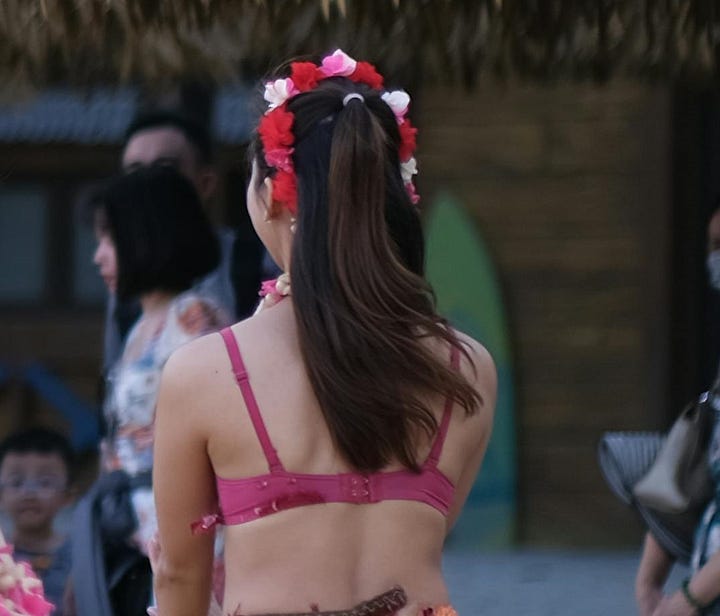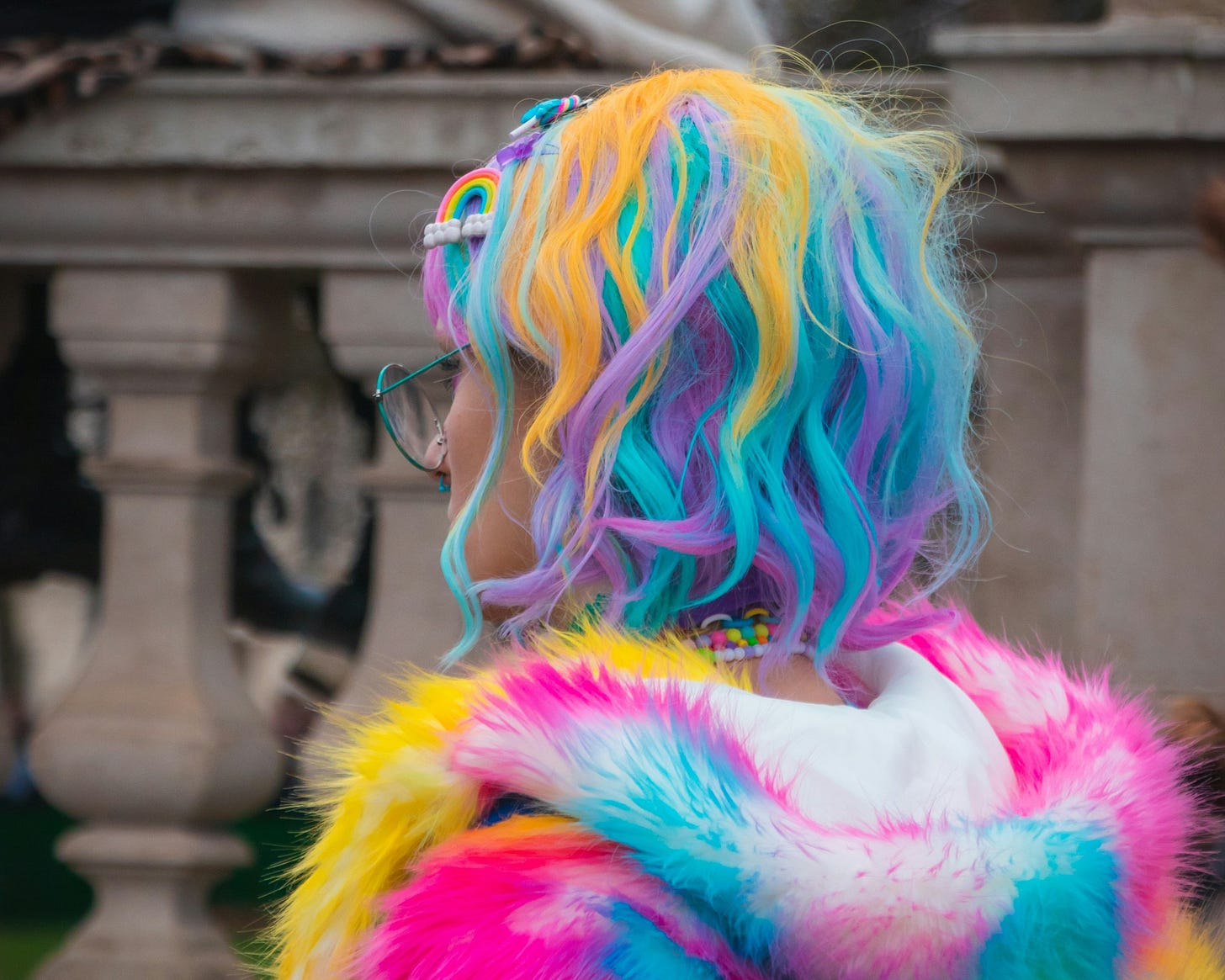DEI and Why It Is a Problem
A nonfiction article contrasting the oppressed/oppressor philosophy with adapting to another culture. For young people age 11 and up.
Has anyone told you that you have “white privilege?” Or that because your skin is brown, you are oppressed?
These are terms and definitions used in Diversity, Equity and Inclusion (DEI), a way of looking at the world that is taught in many schools, from kindergarten through graduate school.
Here are dictionary definitions:
Diversity” means a collection of different types or kinds.
“Equity” means treating different people, ideas or views equally.
“Inclusion” means making something part of the whole.
These ideas sound good, which is how DEI became popular.
But the DEI movement uses the words in a completely new way. In DEI,
“Diversity” means changing the way society is so that certain minority groups will be on top and majority groups will be on the bottom.
“Equity” means bending or getting rid of laws so that certain minority groups can benefit just because they belong to a minority.
“Inclusion” means connecting these certain minority groups together—including them in a huge, powerful group that can force its ideas on everyone else.
Basic Beliefs of DEI
DEI teaches that the most important thing about a person is his or her skin color. It says that the world is made up of Oppressors and Oppressed. And it says that since all Oppressed are victims of the Oppressors, the Oppressed have to support each other.
You are an Oppressor or Oppressed because of the group you were born to. White Christians are Oppressors, Blacks, Arabs and Hispanics are Oppressed.
A Black medical doctor is considered Oppressed because she is Black.
A 7 year old white boy in foster care because his parents were murdered by a Black man is an Oppressor. The Black murderer is given a short prison sentence because he is Oppressed.
You can see that classifying people this way is not logical and can even be called stupid.
Are People Oppressed Because of Their Group?
Years ago, Blacks and other people of color were often discriminated against in the United States. In many places Black people could not use the same public bathroom as whites or eat at the same restaurants. They had to sit at the back of buses, could not buy homes in certain neighborhoods, and more.
But the laws were changed more than 50 years ago, and other laws were passed that even gave Blacks and other minorities advantages in going to private schools and colleges.
Today, in real life, many of the people called Oppressors have better lives than many of the people called Oppressed. And many of the Oppressed are richer or more influential than many of the Oppressors. Here are just a few examples:
Photo by adeolu-eletu-E7RLgUjjazc on Unsplash
Dr. Jerome Adams was Surgeon General of the United States—the chief medical officer of the country. He is Black.
Condoleezza Rice was U.S. Secretary of State, one of the most important positions in the U.S. government. She is Black.
King Salman of Saudi Arabia has a fortune of $18 billion and rules over a country more than 1/5 the size of the U.S.A. He is an Arab.
Giorgio Armani is an Italian who built a business empire that includes men’s and women’s fashions, more than 200 shops around the world, home goods, and even book publishing. In 2021, his personal fortune was around $8.1 billion. He identifies as LGBTQ.[i]
Other exceptions are found all around, even possibly in your neighborhood. Lots of Blacks, Arabs, Hispanics, and LGBTQ people have regular jobs and live in regular neighborhoods. They are not necessarily more “oppressed” than white people.
Everyone has troubles in their lives; some might face discrimination because of their skin color, but others face discrimination because they wear thick eyeglasses, limp, are short, or have other problems that they did not choose. Life is not fair.
The truth, though, is that a large proportion of the so-called Oppressed class are poor, uneducated, or have criminal records. If the cause isn’t Oppression, white supremacy, or racism, what is it?
Why some groups more successful than others
Societies where people have opportunities to attend school, work at jobs that pay a lot of money and live in nice homes or apartments have different cultures than societies that are poorer. Cultures are built on values—what’s considered important and not important—and ways of behaving that are shared by the more successful people in the society.
Beginning around 1830 with the Industrial Revolution and modern travel, people started moving from country to country. Suddenly people with different cultures had to live together. In the USA, at first people tried to assimilate. That is, newcomers learned to live in their new place. They learned to blend in with the new culture. Immigrant parents might have been poor, but a high proportion of their children, who grew up American, were successful. Then, about 50 years ago, a new theory developed: multiculturalism. This means that all cultures are good, and newcomers should not have to adapt to a new culture. They can continue to live according to their old culture. This can lead to a lot of misunderstanding.
In some cultures, if you earn a lot of money you spend it on a big party for your friends and neighbors, while in other cultures you save the money for the future, or buy an expensive car, or give part away to help poor or sick people.
Clothing and hair vary by culture. In the Muslim tradition, women and girls cover their hair and necks, but beautiful long hair is important in Hawaiian culture. [ii],[iii] You can see other differences in dress from their cultures.
Photos: Left, thanh-hue-dao-9554761; Right, danang-wicaksono-539727, both on pexels.


The Jewish culture puts a high value on both studying and obeying laws. As a result, the percentage of Jews in prison is low. The “Gangsta” culture popular in poor Black neighborhoods values violence and lawlessness, and laughs at education. As a result, the percentage of Blacks in prison is high.
In Saudi Arabia, getting high scores in school is valued, so students copy work from other students, even on exams.[iv] In the USA and other Western countries, doing work yourself is valued, and copying someone else’s work is called cheating. It is considered wrong and bad.
Photo by taylor-flowe-4nKOEAQaTgA on Unsplash
Some values are necessary for a peaceful, happy society. These include honesty in business, respecting the rights of others, not stealing, not murdering, and having a fair and honest system of laws and judges.
Other values are necessary to succeed in school. Learning is difficult, and successful students work hard. Their parents make sure they do their homework. Students review what they have learned (sometimes many times), and ask for help when they do not understand. Children from cultures that do not value hard work often do not do well in school. Their parents do not think their children need to work so hard, so they do not worry about homework, reviewing or grades.
Values have nothing to do with the color of one’s skin and everything to do with culture. Even values that are called “white” or “white supremist” are just values that anyone can learn. These include:
Choosing to dress the way one is expected to for any occasion, such as wearing hiking boots, long pants and a long-sleeved shirt when going hiking, or bathing, combing one’s hair, and wearing clean, dressy clothes when going to a bar mitzvah or quinceanera, or pulling pants up so neither underwear nor butt cracks show.
Getting places on time: school, a job, a meeting, a date.
Being polite. Saying please and thank-you.
Paying attention in school and doing homework.
Not using swear words at work, at church, or in classes.
Knowing how and when to use these and other values does not mean you have to use them all the time. Being smart means using them when they are appropriate, and ignoring them if you are in situations where a different culture is being used. But if you know what is expected and choose to do something else, do not call it “racist” or “discrimination.” It is neither; it is ignoring cultural expectations. Using cultural expectations helps make society run smoothly. Ignoring them, or deliberately doing the opposite, causes problems—mostly for you.
Differences between Culture and the Oppressor-Oppressed Philosophy
In the Oppressor-Oppressed philosophy, people are victims of birth. They are born either Oppressors or Oppressed, and they cannot change that. This means that no matter how successful an “Oppressed” person is, he can still think of himself as a victim.
One problem with this is that someone who thinks he (or she) is a victim may spend a lot of energy looking for proof. You can almost always find what you are looking for—even though you might be misunderstanding what you see. Anthony O’Neal, a Black podcaster, once spoke about being in a car with Dave Ramsey, a White financial guru, when Ramsey was pulled over by a policeman for speeding. Said O’Neal, “I was shocked at the way the officer spoke to Dave. I was once pulled over for speeding, and the officer spoke to me the same way. I thought he was a racist and spoke like that because I was Black. But this policeman spoke to Dave exactly the same way. I realized that’s just how police speak, it’s not racism.”
Learning Culture
Little children learn culture by watching what their families do. They also learn from school, their house of worship, books, movies and TV, friends and neighbors. Immigrants often speak two languages. At home, they use the language of the place they left. At work or at school, they speak the language of the new country. At home, they may eat traditional foods, wear traditional clothing, decorate their homes traditionally, and spend their free time the way they did in their old country. In public, they wear what everyone else does, eat at the same restaurants, follow the same sports teams, and do what they must so that they fit in.
People who see themselves and their group as victims do not try to fit in. They want everyone to accept them the way they are, and they want the major culture to change to fit them. This is narcissistic. That means they think they and their culture are the only important one.
Photo by Tommy van Kessel on Unsplash

Sometimes this is simply they want to fit in with a group, any group. Sometimes it’s because they weren’t taught better. Sometimes it comes from jealousy: they want what others have, and do not understand how much work went into becoming successful. Sometimes it comes from laziness. Learning is difficult, especially if you come from a culture that did not value education.
To be successful, one has to work hard. It is easier to sit around and complain about being oppressed. And if you call yourself a victim and don’t try to learn and change, you cannot fail. Only people who try can fail.
So are the Oppressed victims? Oppression by unfair laws ended, in the USA, long ago. But they are still victims: victims of a foolish and evil philosophy that tells them they and their children will always be victims, so it isn’t even worth trying to succeed.
Because of their frustration at thinking they will always be victims, they are full of rage. And they spill their rage onto innocent people who happen to be born in cultures that lead to success. They may riot, steal, burn down cars and businesses, and even murder because of their anger. These behaviors are evil.
No one is telling people of color and other “oppressed” groups like the LGBTQ+ to scrap their cultures. But they and their children—and society—will be happier and healthier if they learn to throw out any parts that hurt themselves and others and to balance between the two cultures, just like every immigrant group that left a bad life behind and came to make a new, better life in America. But until they open their eyes and adapt, they will stay foolish and, by disrupting everyone else’s lives, even evil.
[i] Olito, F., 12 of the richest LGBTQ people in the world, Business Insider, June 5, 2021, https://www.businessinsider.com/richest-lgbtq-people-in-the-world?op=1, accessed Feb. 22, 2024.
[ii] Introduction to Hawaiian Hairstyles, June 9, 2023, https://dolphingalleries.com/blogs/dolphin-galleries-blog/introduction-to-hawaiian-hairstyles, accessed Feb. 22, 2024.
[iii] Takayama, K.A., Thick as Blood, 1CT News, Mar. 10, 2015, updated Sept. 13, 2018, https://ictnews.org/archive/native-hawaiian-hair-is-thick-as-blood-says-essay-winner, accessed Feb. 22, 2024.
[iv] For 3 years I taught English as a Second Language at a preparatory language school associated with Idaho State University. A majority of our students were from Saudi Arabia. Getting them to understand what Americans call cheating, and why it is considered wrong, was very difficult because their culture is so different.
For Parents, Teachers and Others
This is a child-friendly companion to this week’s adult article, The Path to Wokeism.
Certain minority and non-white groups—Arabs, Native Americans, Hispanics, African-Americans, Pacific Islanders, and sometimes Indians (from India)—are considered Oppressed. LGBTQ+ people are Oppressed.
Chinese, Japanese, and South Korean are considered Oppressors. White Europeans are considered Oppressors. Jews are considered White Oppressors regardless of their skin tone. (Although the majority of Jews in the USA have light skin, the majority of Jews in the world have darker skins, going from light tan to black. Unless there has been recent intermarriage or conversion, Jews are identifiable by physical characteristics: that is, they look “other.” Growing up, I was asked many times what my race was, so it is weird that now I count as a White Oppressor.)
Here are two Israeli examples of the idiocy of these classifications.
One group, we’ll call it A, has been firing rockets into towns (we’ll call them B) right across their border for years. All the people living in B had had to build bomb shelters in their homes, and one B town has a huge indoor playground. In the middle are climbing structures, slides, swings, and other fun things for little kids, but there are also activities for older kids. That big central area is also used for things like ping-pong tournaments and concerts. But around the edges are classrooms that are bomb shelters. These are used for daycare, after-school programs, and even birthday parties. This playground is needed because the children cannot not play outside because of frequent rocket attacks. Who are the Oppressed and who are the Oppressors? According to DEI, the people in B, who needed bomb shelters in their homes and an indoor playground, are the Oppressors and the ones in A, who shoot off thousand of rockets, are the Oppressed.
People, we’ll call them Group C, cross a national border and kidnap hundreds of Group D people. Two of these are little kids—a 9-month-old baby and his 4-year-old brother. Group X demonstrates in support of the oppressed group. Do you think they demonstrate to support Group D (to help the children) or Group C (the kidnappers)? They demonstrate to support the kidnappers. They believe the children are the Oppressors and their kidnappers are the Oppressed.
Industrial Revolution: beginning in the late 1700s but growing quickly after around 1830, people began using machines run by steam, coal, and later electricity. Before, most things were made in small shops, often attached to the worker’s home (or the family lived behind or above the workshop). Suddenly travel became much easier.
After giving much thought to the question of activities for children, I think asking questions and eliciting questions from the children—opening the lines of communication—are the best ways. Do not be afraid of giving hard answers to older children. White-washing to be kind to those who are saying or doing bad things is actually unkind.
I say this from experience. I spent many years (and thousands of dollars for therapy) trying to understand how my behavior was causing me trouble, because my parents always denied that antisemitism was a factor in our lives. For example, when I was in high school I was accused by them of not trying hard enough to make friends. But 40 years later, when someone put together an Internet chat group of kids from my class, the girls who had been nastiest to me, and were probably behind many of my other school problems, spewed their hatred of Jews and Israel, blaming us for the 9/11 terrorist attacks in numerous vile and disgusting posts. Only a former Navy SEAL who was in only one of my classes in 4 years, tried to stop them. I quit the chat after a couple of weeks.





💥 boom! 🎉